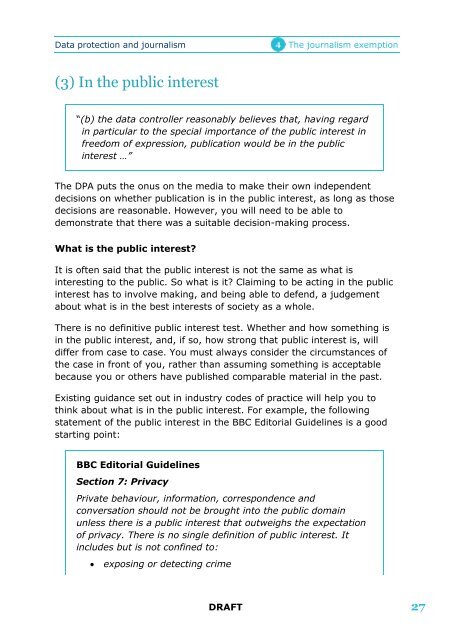data-protection-and-journalism-a-guide-for-the-media-draft
data-protection-and-journalism-a-guide-for-the-media-draft
data-protection-and-journalism-a-guide-for-the-media-draft
You also want an ePaper? Increase the reach of your titles
YUMPU automatically turns print PDFs into web optimized ePapers that Google loves.
Data <strong>protection</strong> <strong>and</strong> <strong>journalism</strong><br />
The <strong>journalism</strong> exemption<br />
(3) In <strong>the</strong> public interest<br />
“(b) <strong>the</strong> <strong>data</strong> controller reasonably believes that, having regard<br />
in particular to <strong>the</strong> special importance of <strong>the</strong> public interest in<br />
freedom of expression, publication would be in <strong>the</strong> public<br />
interest …”<br />
The DPA puts <strong>the</strong> onus on <strong>the</strong> <strong>media</strong> to make <strong>the</strong>ir own independent<br />
decisions on whe<strong>the</strong>r publication is in <strong>the</strong> public interest, as long as those<br />
decisions are reasonable. However, you will need to be able to<br />
demonstrate that <strong>the</strong>re was a suitable decision-making process.<br />
What is <strong>the</strong> public interest?<br />
It is often said that <strong>the</strong> public interest is not <strong>the</strong> same as what is<br />
interesting to <strong>the</strong> public. So what is it? Claiming to be acting in <strong>the</strong> public<br />
interest has to involve making, <strong>and</strong> being able to defend, a judgement<br />
about what is in <strong>the</strong> best interests of society as a whole.<br />
There is no definitive public interest test. Whe<strong>the</strong>r <strong>and</strong> how something is<br />
in <strong>the</strong> public interest, <strong>and</strong>, if so, how strong that public interest is, will<br />
differ from case to case. You must always consider <strong>the</strong> circumstances of<br />
<strong>the</strong> case in front of you, ra<strong>the</strong>r than assuming something is acceptable<br />
because you or o<strong>the</strong>rs have published comparable material in <strong>the</strong> past.<br />
Existing guidance set out in industry codes of practice will help you to<br />
think about what is in <strong>the</strong> public interest. For example, <strong>the</strong> following<br />
statement of <strong>the</strong> public interest in <strong>the</strong> BBC Editorial Guidelines is a good<br />
starting point:<br />
BBC Editorial Guidelines<br />
Section 7: Privacy<br />
Private behaviour, in<strong>for</strong>mation, correspondence <strong>and</strong><br />
conversation should not be brought into <strong>the</strong> public domain<br />
unless <strong>the</strong>re is a public interest that outweighs <strong>the</strong> expectation<br />
of privacy. There is no single definition of public interest. It<br />
includes but is not confined to:<br />
<br />
exposing or detecting crime<br />
DRAFT 27




